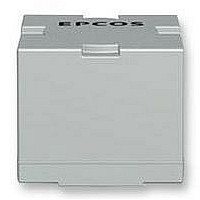B82442A1334K EPCOS Inc, B82442A1334K Datasheet - Page 19

B82442A1334K
Manufacturer Part Number
B82442A1334K
Description
INDUCTOR, 2220 CASE, 330UH
Manufacturer
EPCOS Inc
Series
SIMIDr
Specifications of B82442A1334K
Inductance Tolerance
± 10%
Dc Resistance Max
3.92ohm
Dc Current Rating
140mA
Resonant Frequency
3.2MHz
Q @ Vr F
20
Core Material
Ferrite
Inductor Case Style
2220
No. Of Pins
2
Inductance
330µH
Tolerance
10 %
Maximum Dc Current
140 mAmps
Maximum Dc Resistance
3.92 Ohms
Self Resonant Frequency
3.2 MHz
Q Minimum
20
Operating Temperature Range
- 55 C to + 150 C
Termination Style
SMD/SMT
Package / Case
2220 (5650 metric)
Dimensions
5 mm W x 5.6 mm L
Test Frequency
0.796 MHz
Svhc
No SVHC (18-Jun-2010)
Rohs Compliant
Yes
Lead Free Status / RoHS Status
Lead free / RoHS Compliant
Available stocks
Company
Part Number
Manufacturer
Quantity
Price
Company:
Part Number:
B82442A1334K
Manufacturer:
EPCOS
Quantity:
12 000
Company:
Part Number:
B82442A1334K000
Manufacturer:
EPCOS
Quantity:
60 000
Part Number:
B82442A1334K000
Manufacturer:
EPCOS/爱普科斯
Quantity:
20 000
8.3
Figure 13
ductance. One of the chokes has a two-layer winding and the other is randomly wound. The choke
with random windings has a considerably higher first resonance frequency. The spurious resonanc-
es are very much higher than 10 MHz. The impedance at frequencies above the first resonance fre-
quency is approximately five times higher. This leads to better interference suppression at high
frequencies.
Fig. 13
The RF characteristics of all chokes supplied by EPCOS are within the specifications and reproduc-
ible, as the winding processes which we have developed for single-layer, multilayer and random
winding ensure that the characteristics of the inductors produced display very little variation.
The reproducibility of electrical characteristics of chokes is mainly determined by the production
technique used. At EPCOS, coils are wound mainly by automatic machines (either fully or semi-au-
tomated). This permits even complicated winding patterns to be produced in large production runs
with very little variation in product characteristics. In
chokes, some wound manually and some by machine, are shown for comparison. With the random
winding used in this comparison, the advantages of machine winding are clearly noticeable.
General Technical Information
RF characteristics of various types of winding
Random wdg.
2-layer wdg.
Impedance | Z | versus frequency f
comparison between two-layer winding and random winding
shows the relation between the impedance and the frequency for two chokes of equal in-
27
04/00
fig.
14, the impedance curves of several

















